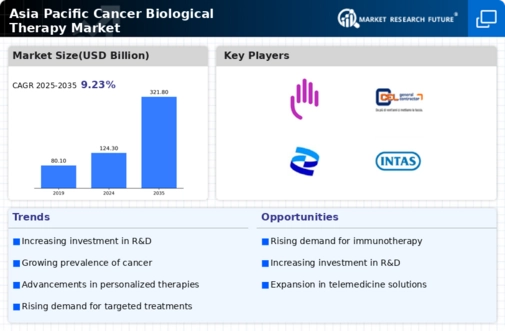Market Trends
Key Emerging Trends in the APAC Cancer Biological Therapy Market
The Cancer Biological Therapy market has experienced a lot of patterns shaping the cancer treatment world. Biological therapies, also known as immunotherapies, have developed into an encouraging avenue for cancer patients thereby revolutionizing conventional methods used to treat the disease. One interesting trend is personalized medicine that focuses more on patient-specific genetic profiles during treatment. Here we leave one-size-fits-all approach and allows more successful and directed interventions.
Moreover, the rise of combination therapies is another key trend in the Cancer Biological Therapy market. The increasing focus on combinations of different biological therapies or mixing up biologic agents with traditional treatments like chemotherapy is being studied by researchers and pharmaceutical companies with a view to exploiting synergistic effects. The aim is to maximize therapy efficacy while minimizing harmful side effects. Combinations of immune checkpoint inhibitors, CAR-T cell therapy, targeted therapies are becoming popular giving hope for tough forms of tumors.
Adoption of next-generation sequencing (NGS) technologies affects market trends too. It provides an opportunity for comprehensive analysis of genetic aberrations within malignant cells thus enabling identification of specific targets for biological therapies. As such, it has resulted in development of more accurate and efficient treatment options leading to better outcomes among patients. On top of that, incorporation of NGS into regular clinical practice continues to increase thereby enhancing progress in cancer biological therapy.
Furthermore, there has been an increase in research and development activities within the Cancer Biological Therapy market. Advanced understanding about cancer biology has led to discovery new therapeutic targets that are underpinning novel biological remedies being introduced into the market place. Exploring novel immune checkpoints, biomarkers as well as therapeutic agents broadens our armamentarium against different cancers types globally This highly dynamic research environment promotes collaborations between academia-industry-regulatory bodies which hastens scientific discoveries’ translation into clinical applications.
Immunotherapy is emerging as a major component within biological therapy segment. Notably, some immune checkpoint inhibitors like PD-1 and PD-L1 inhibitors have shown impressive success in certain cancers bringing about durable responses and long-term survival benefits for patients. Consequently, new immunotherapeutic agents are being approved and integrated into standard treatment protocols thereby changing the cancer treatment landscape across various types of cancer.
Another market trend is the increasing emphasis on biosimilars development in Cancer Biological Therapy segment. These biological products that are highly similar to authorized biologics, referred to as biosimilars, represent a cheaper alternative increasing access to advanced therapies. This movement is especially important in areas where cost considerations dominate health care decisions enabling wider patient reach of efficient anti-cancer treatments.”
















Leave a Comment